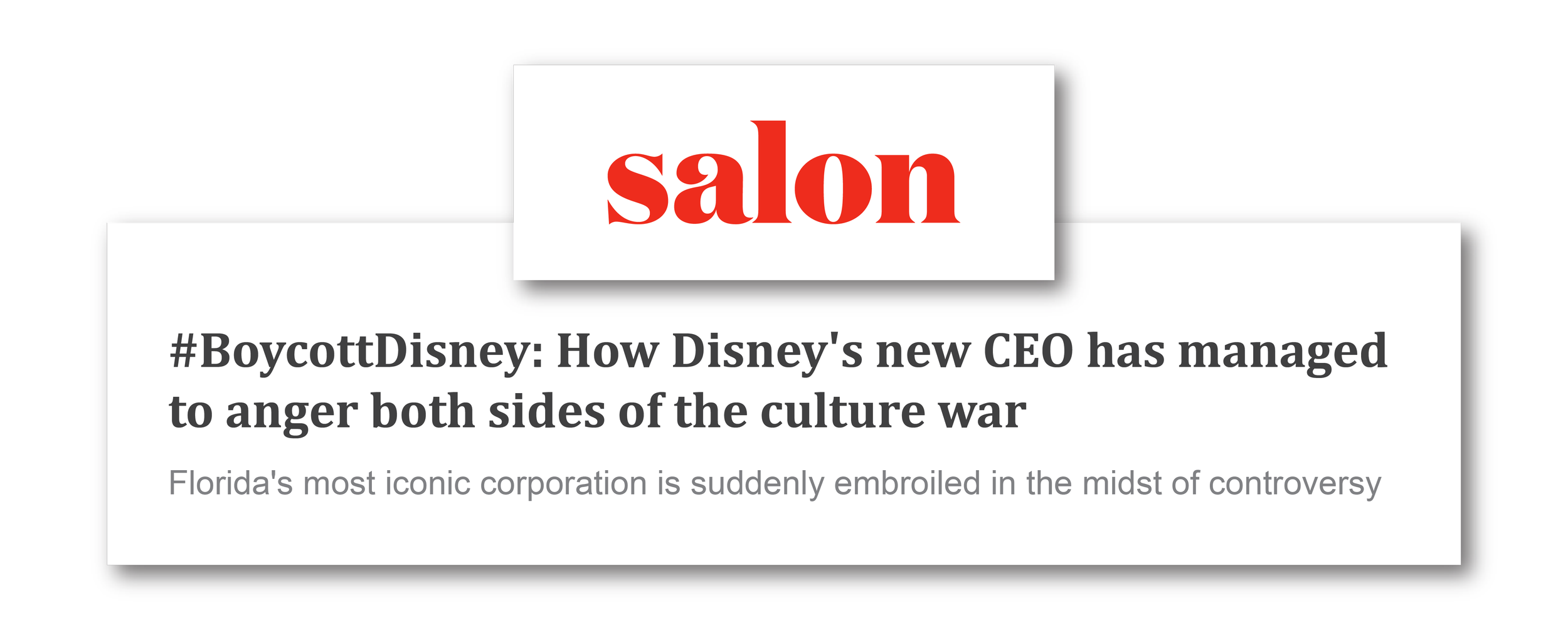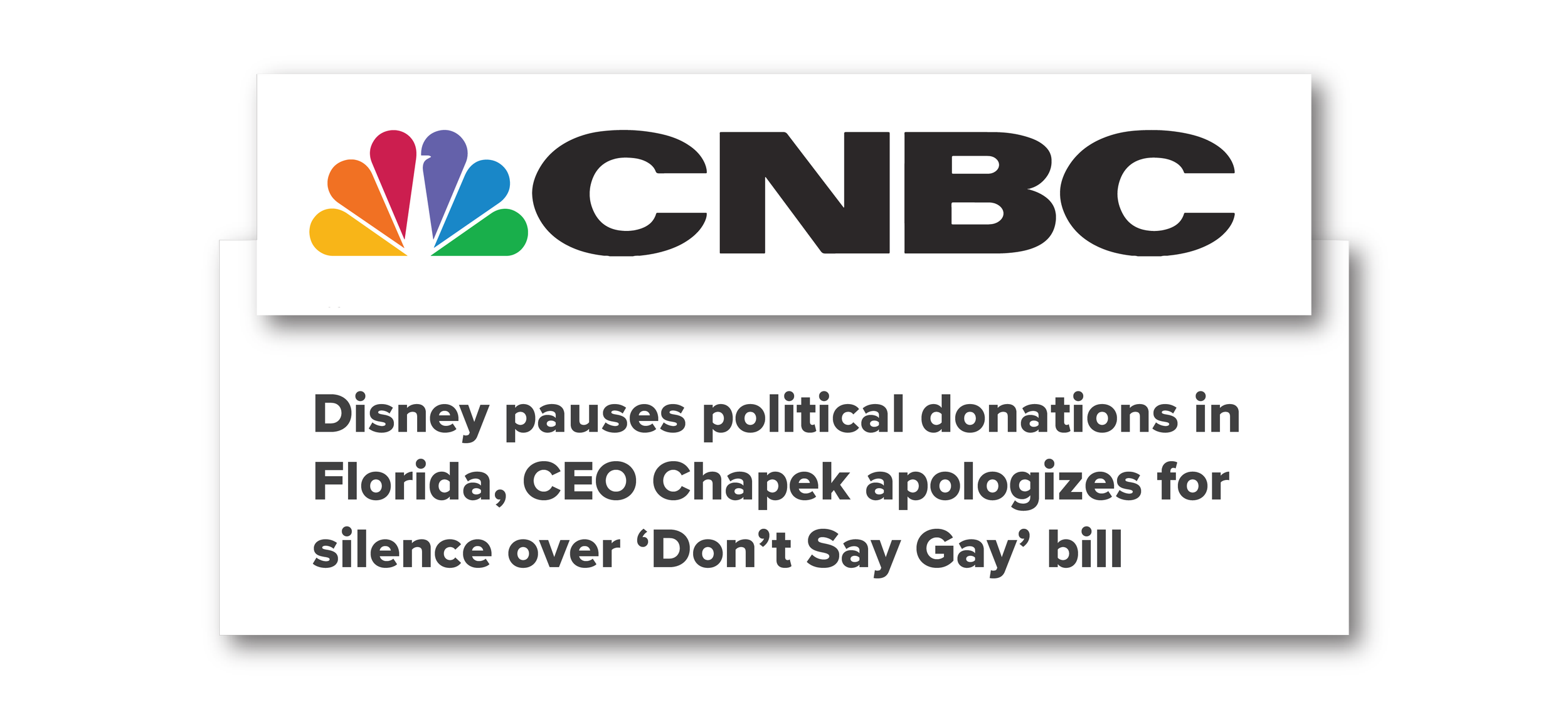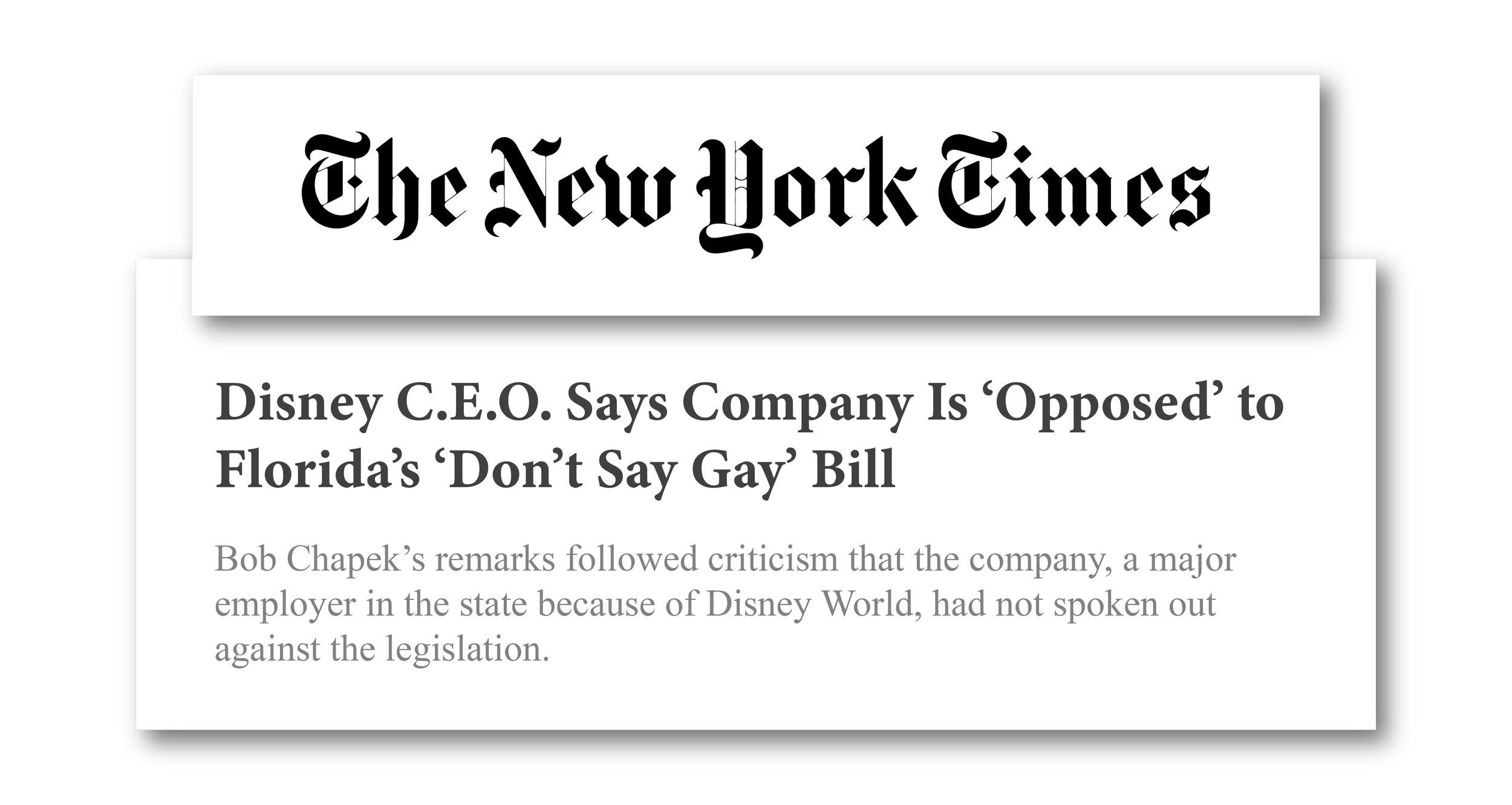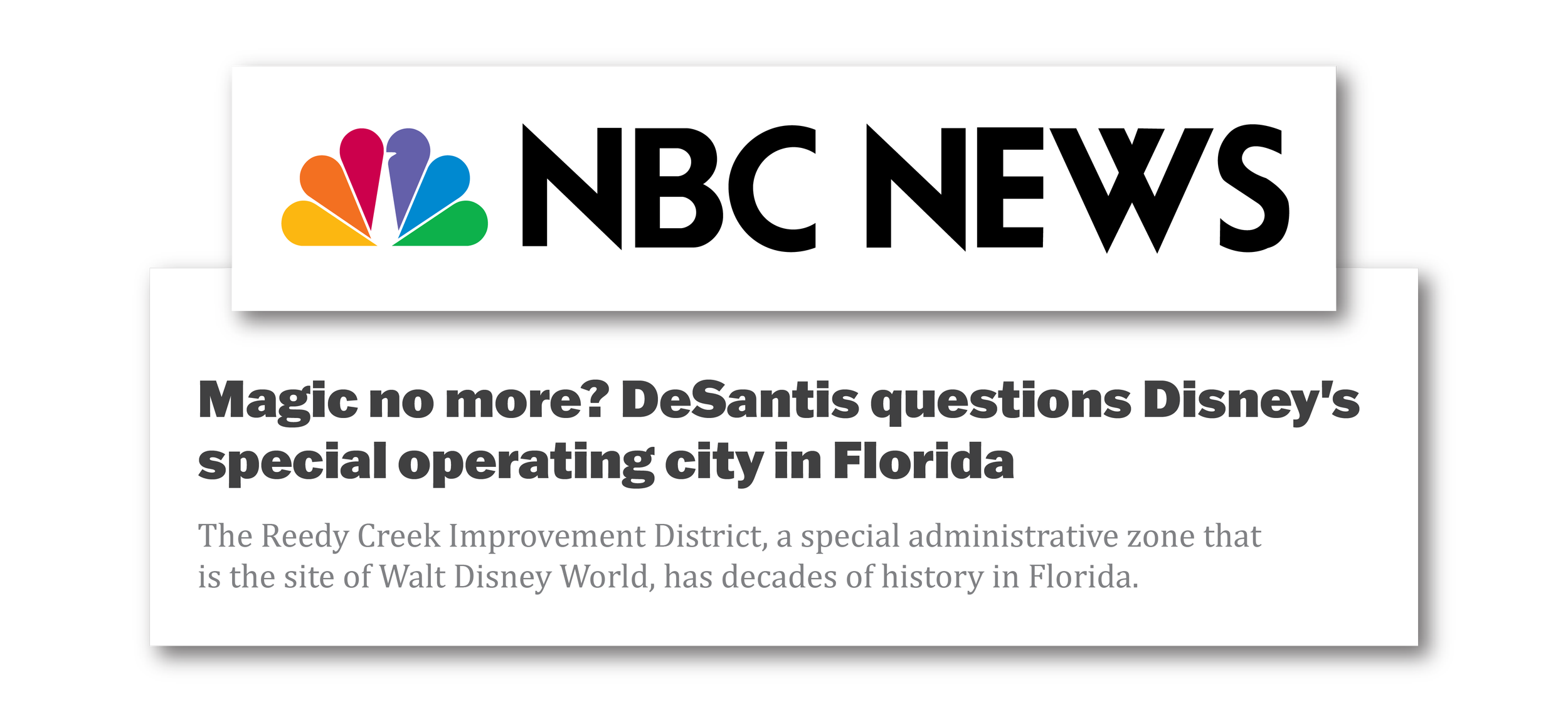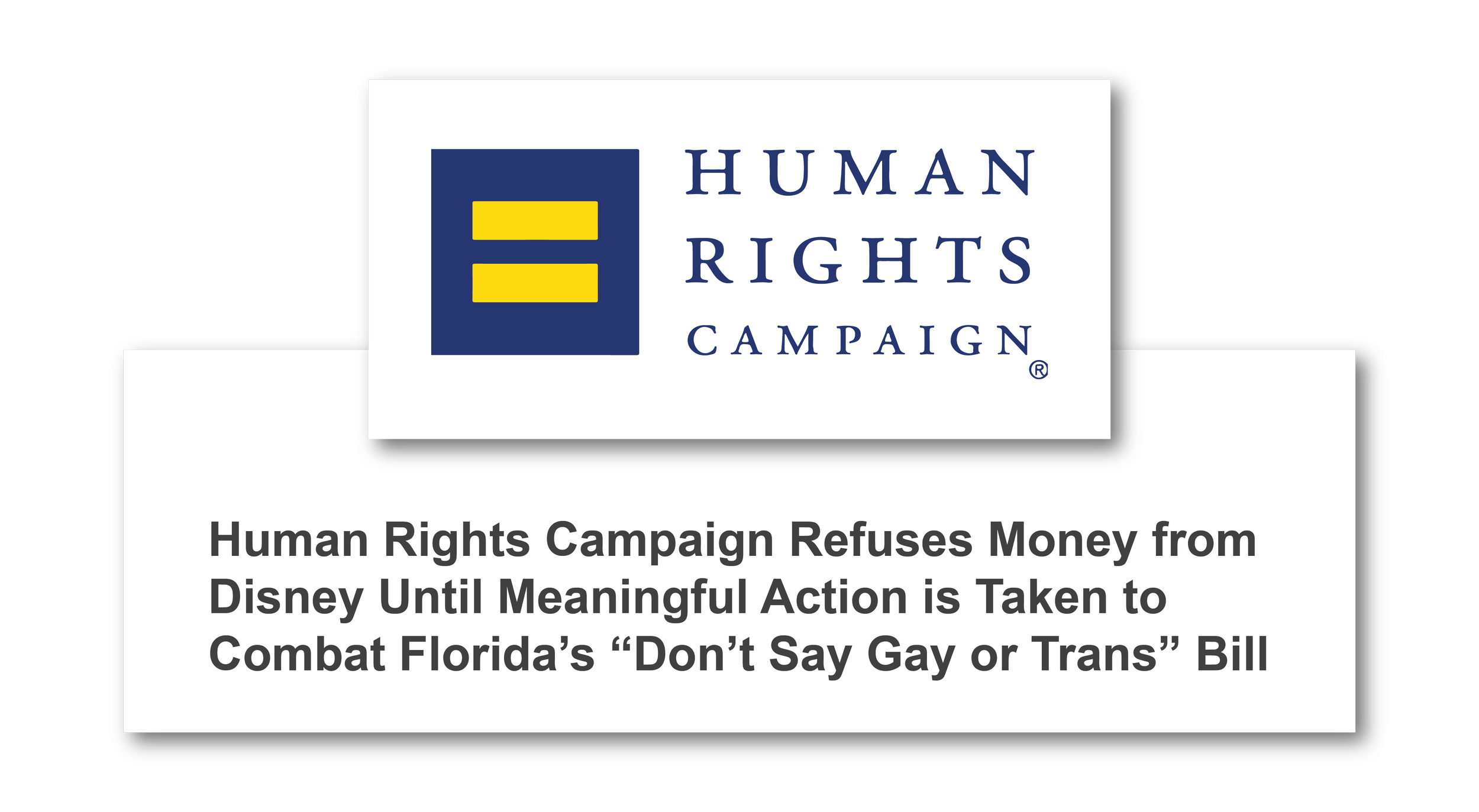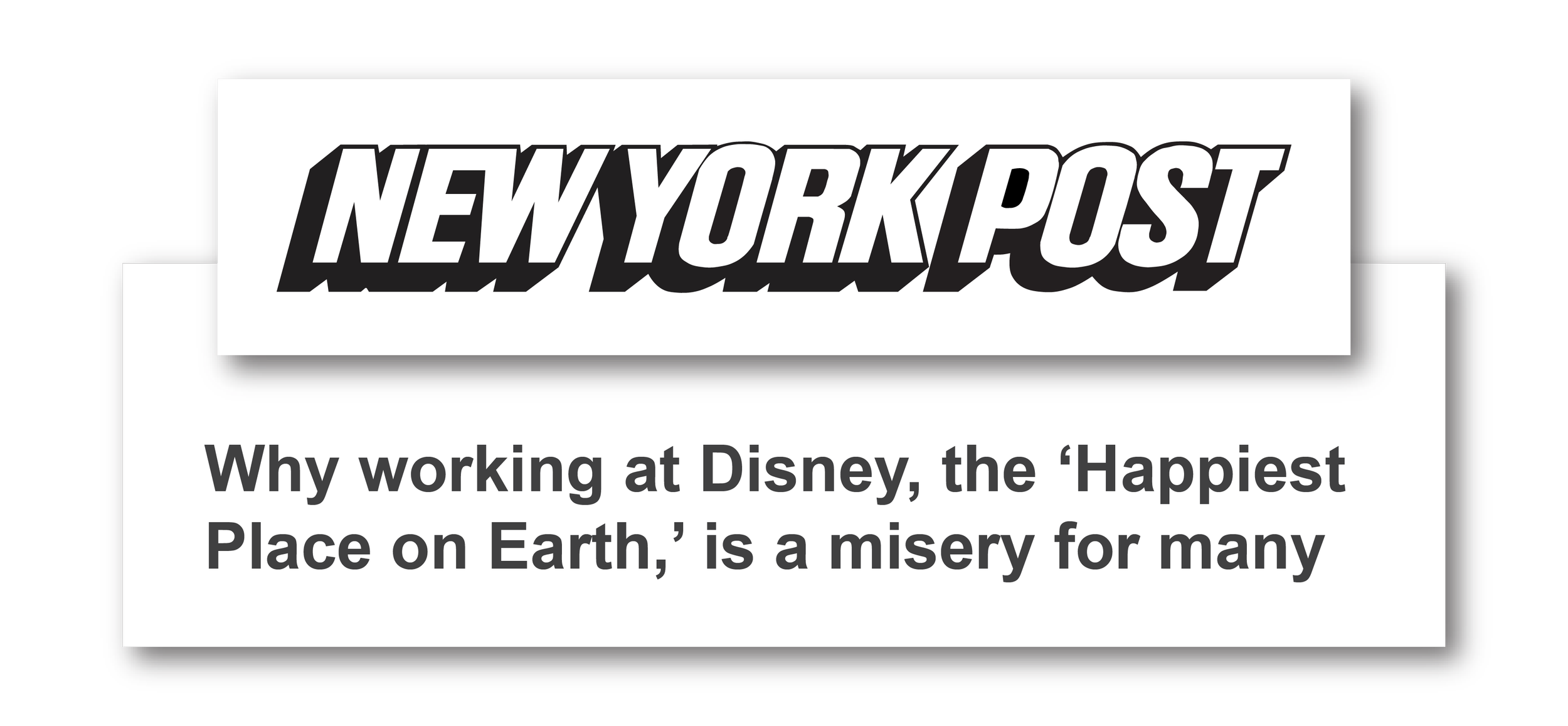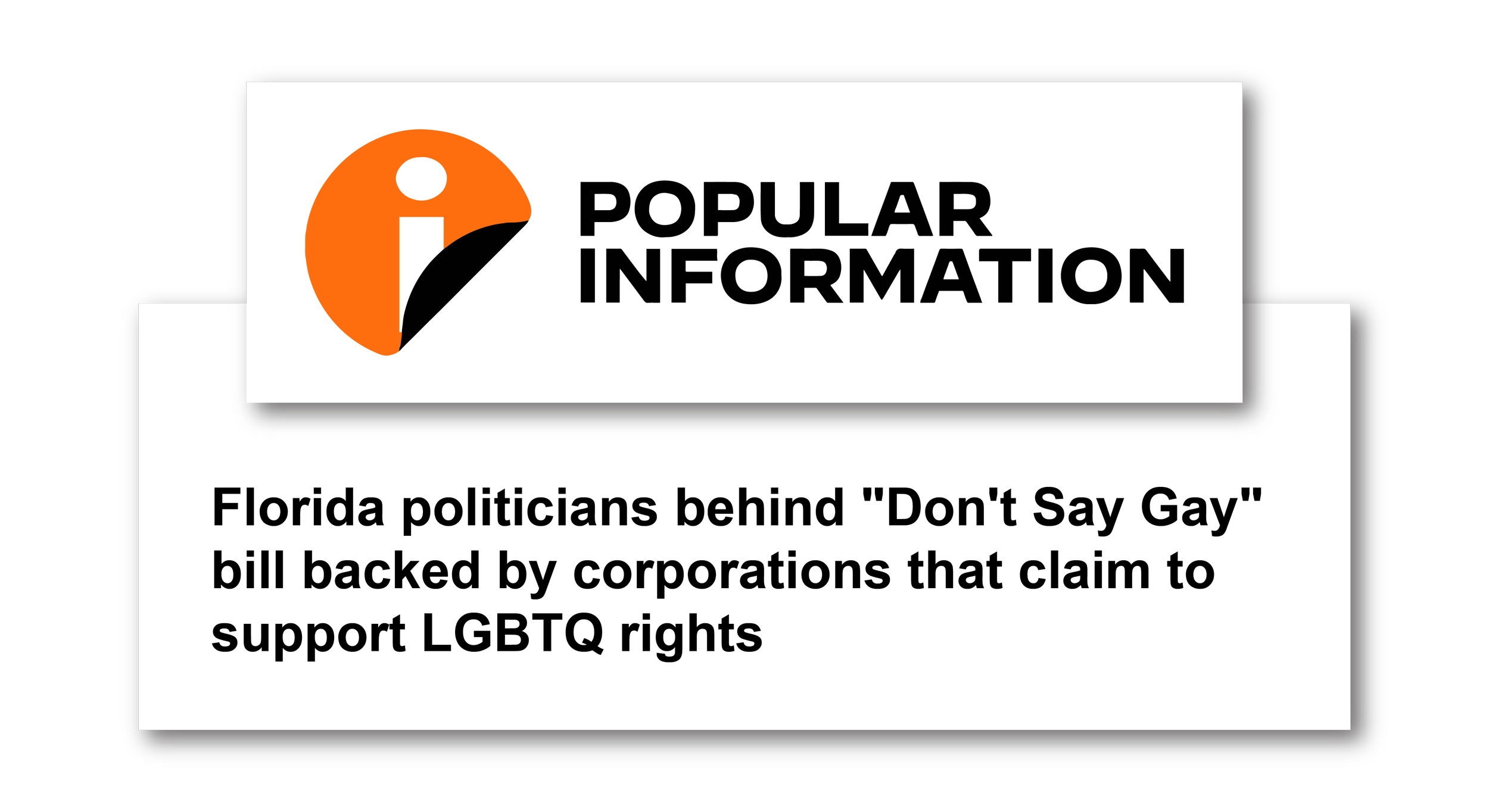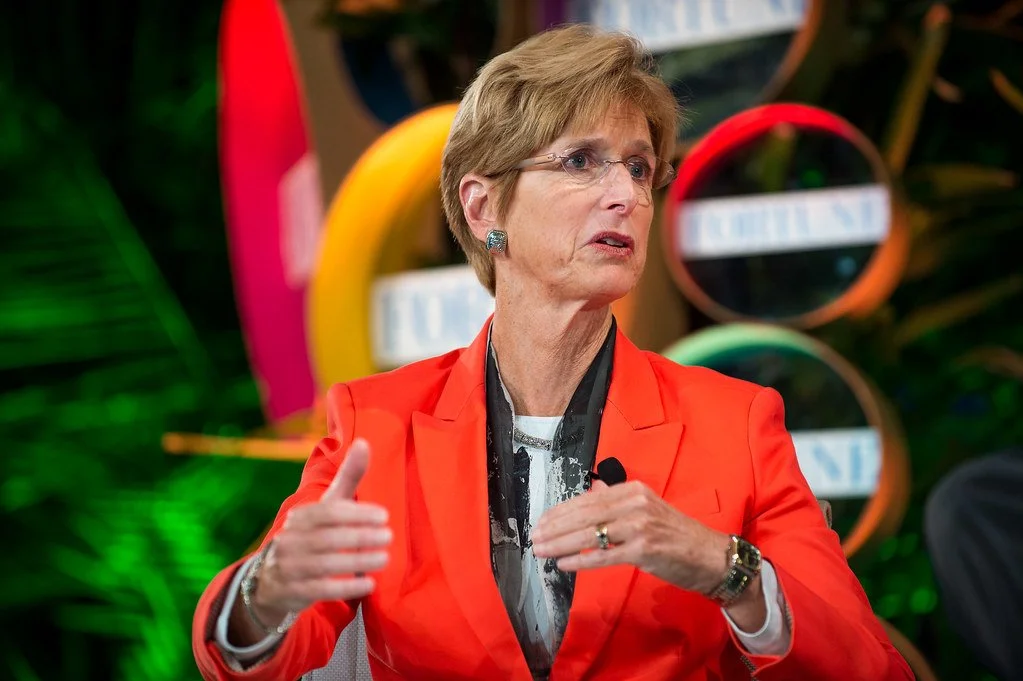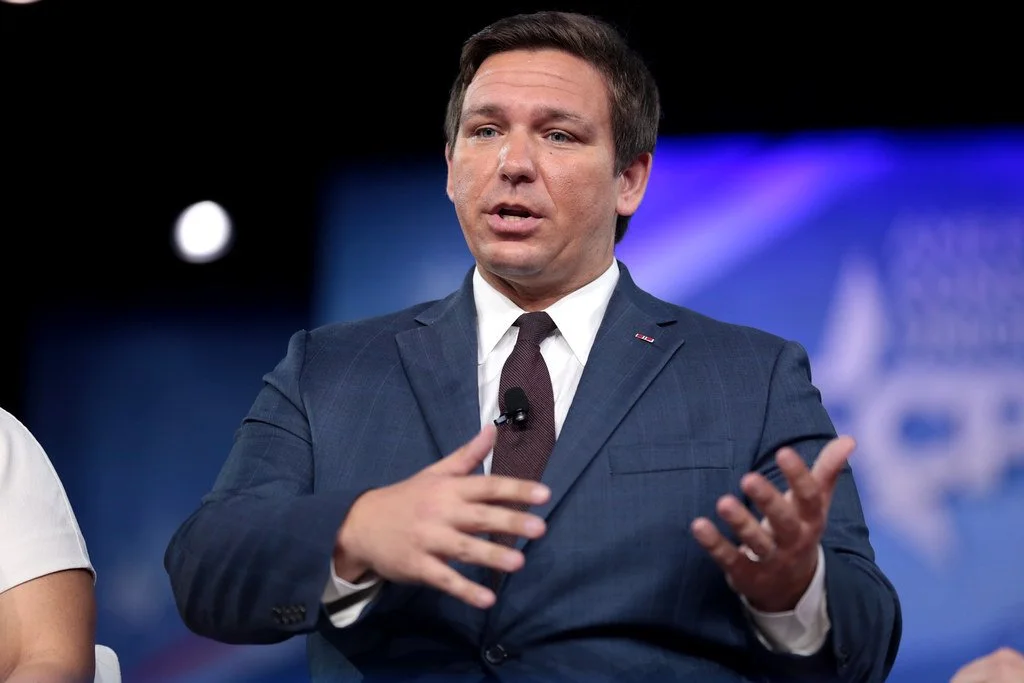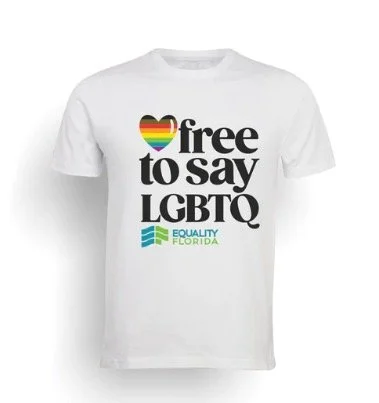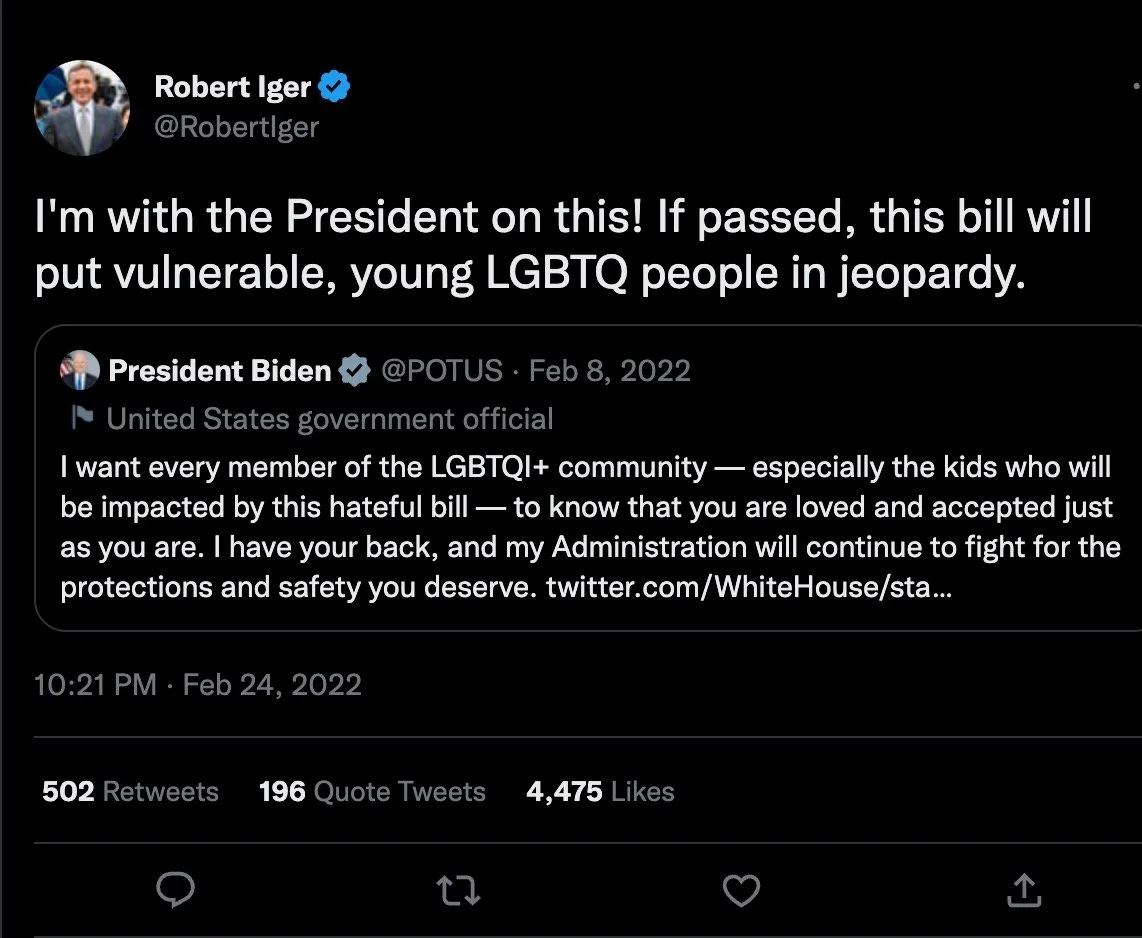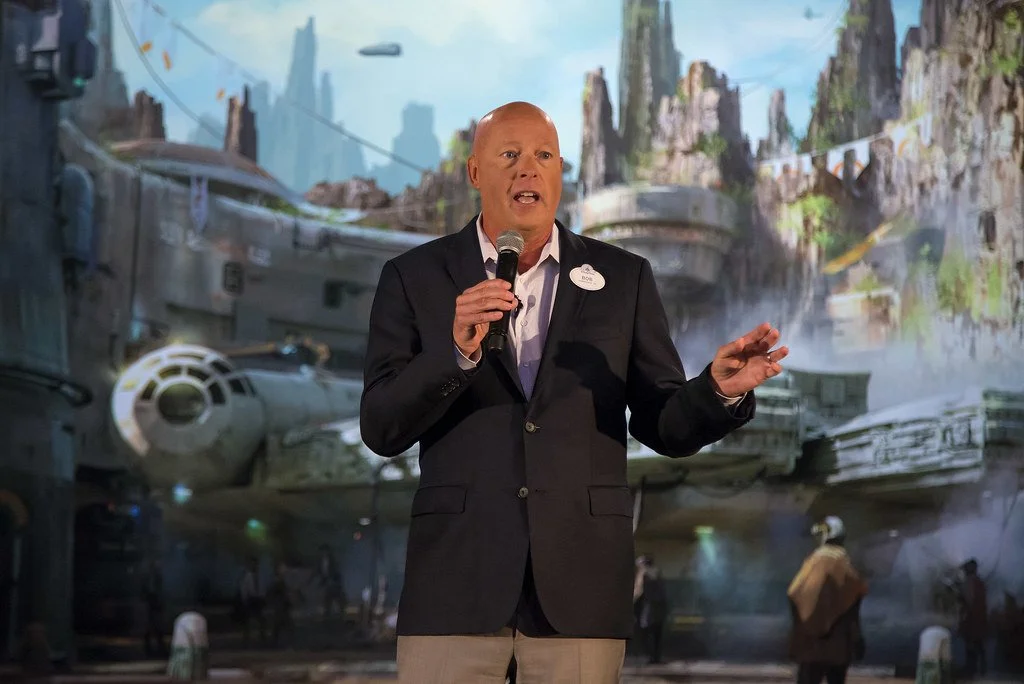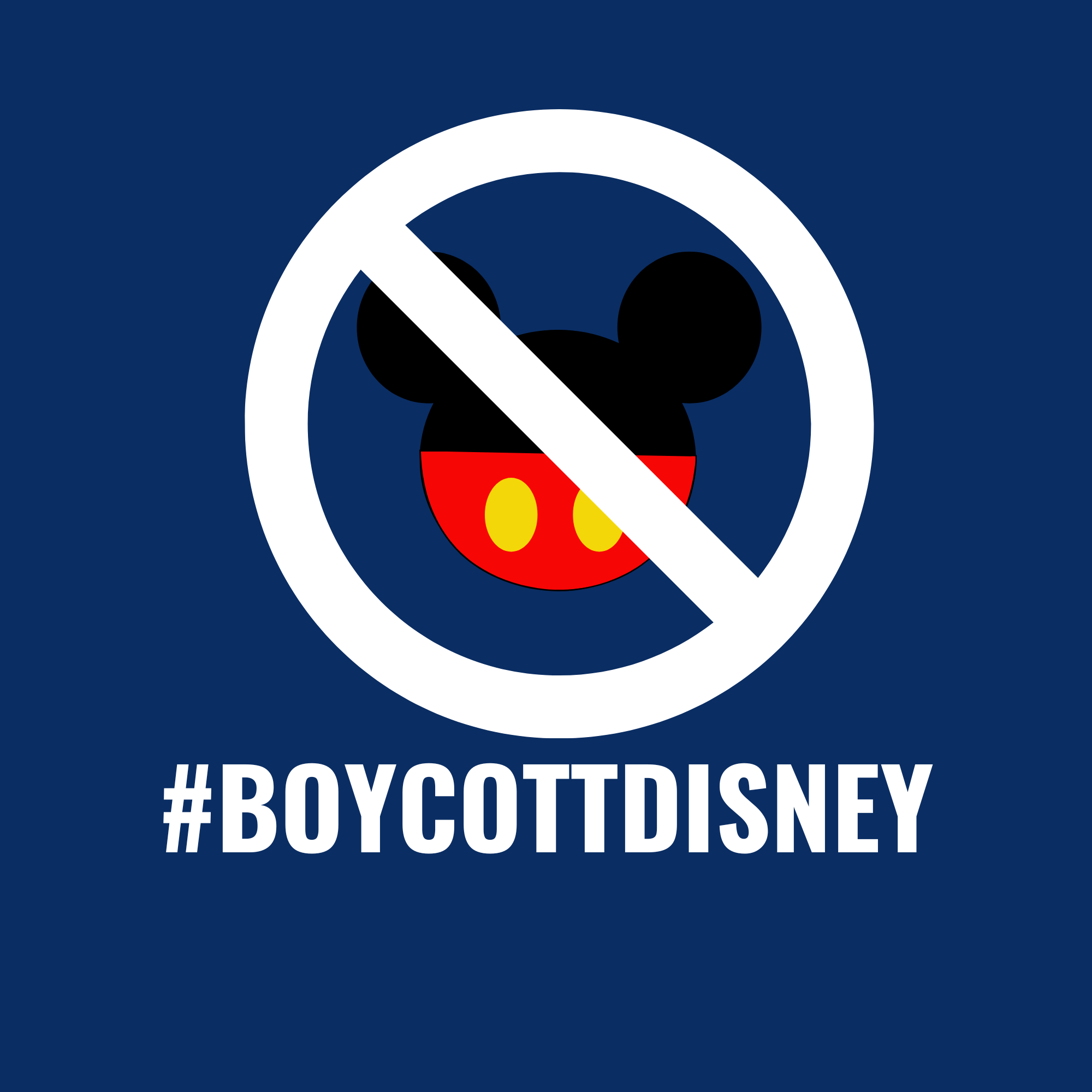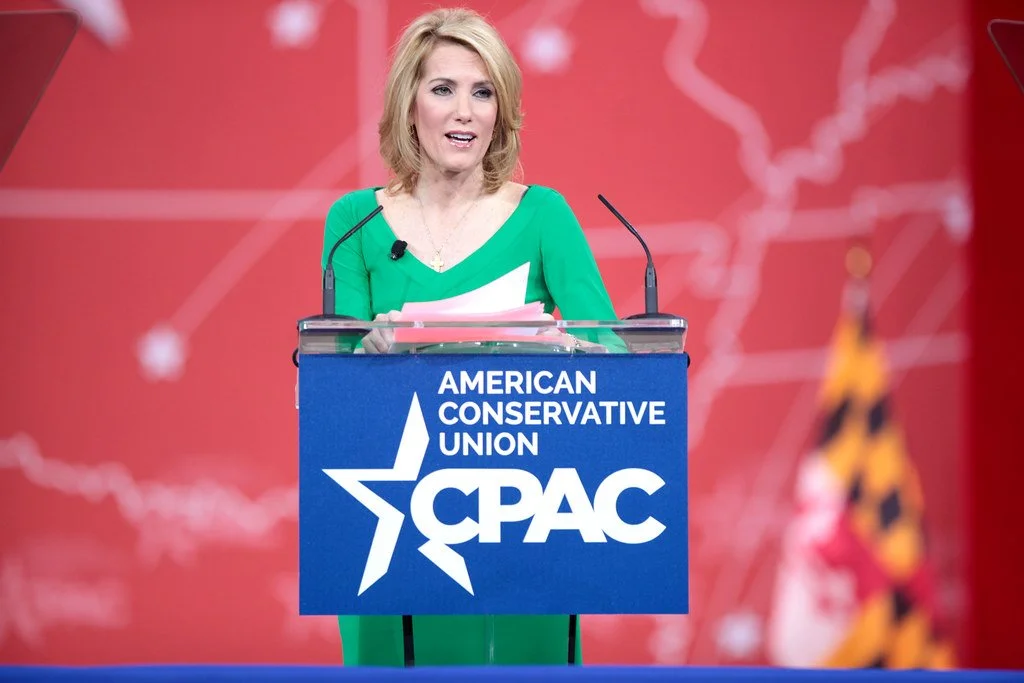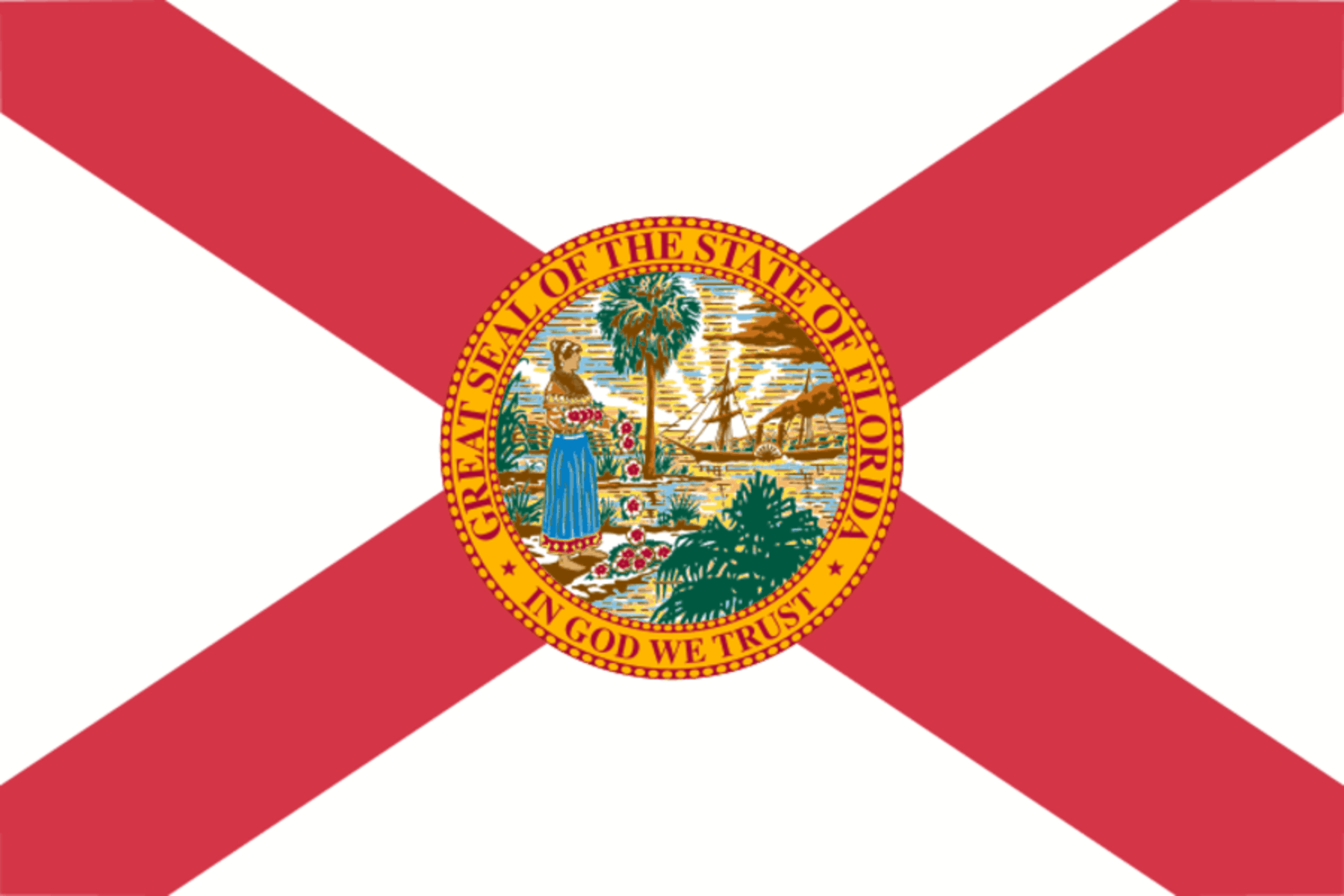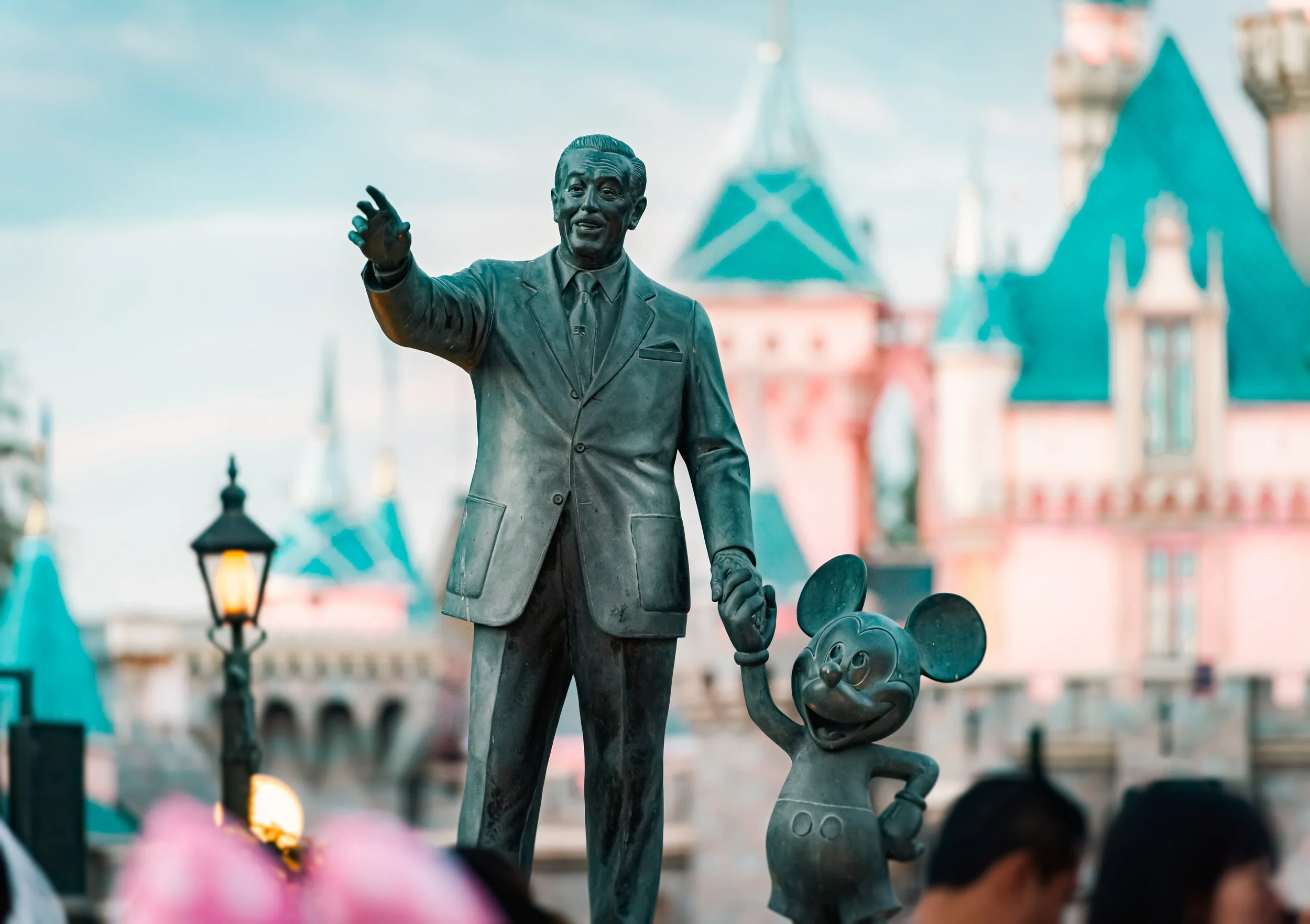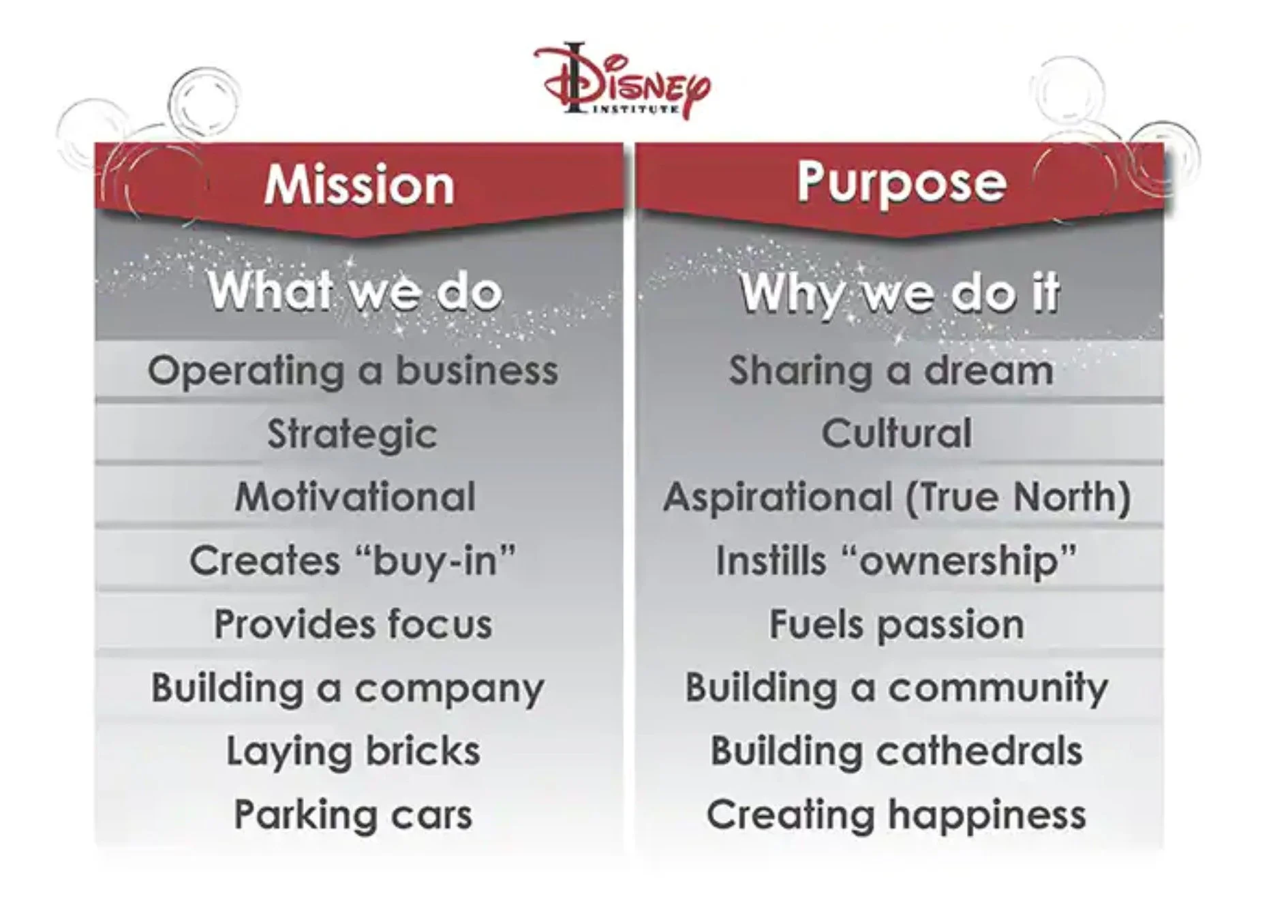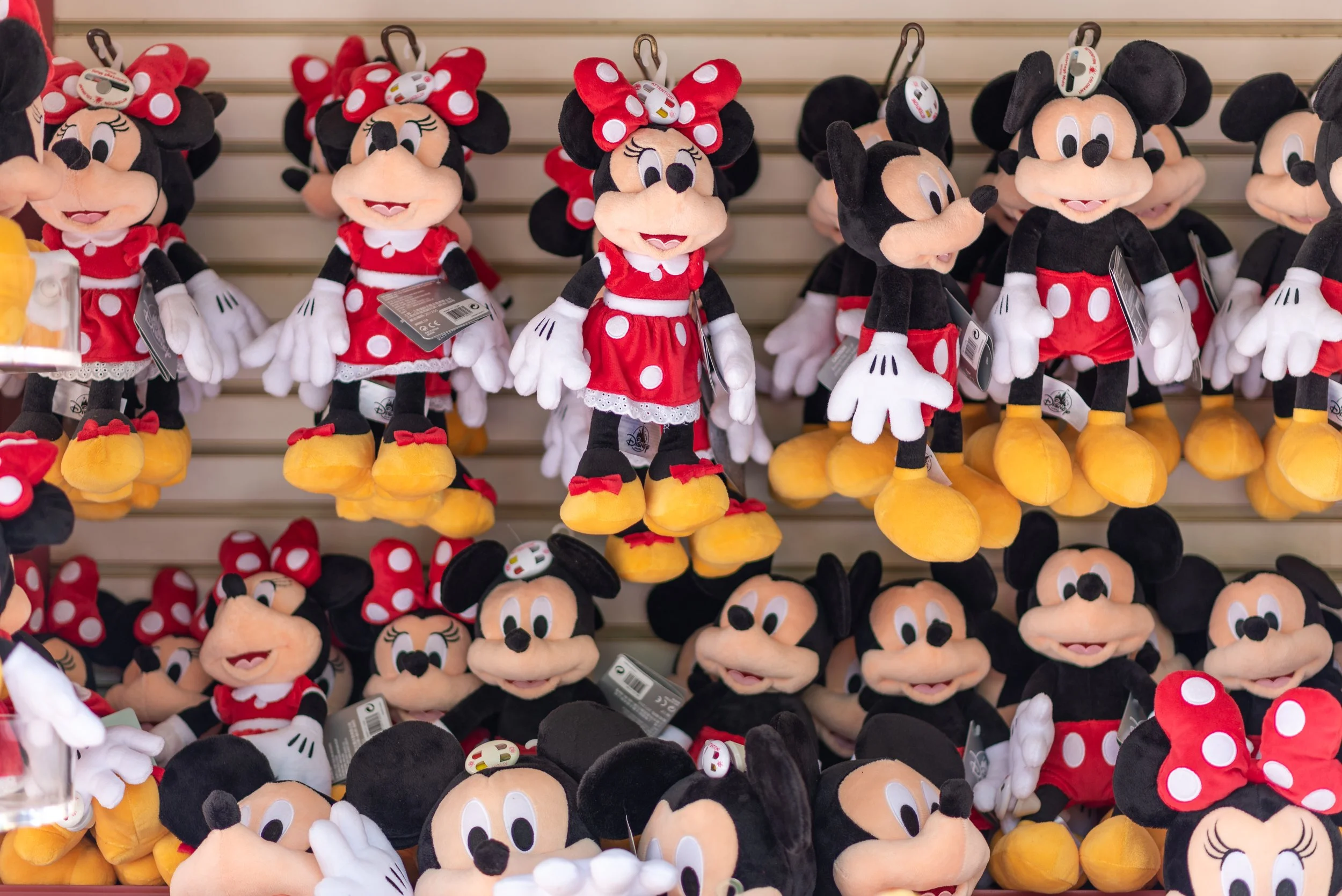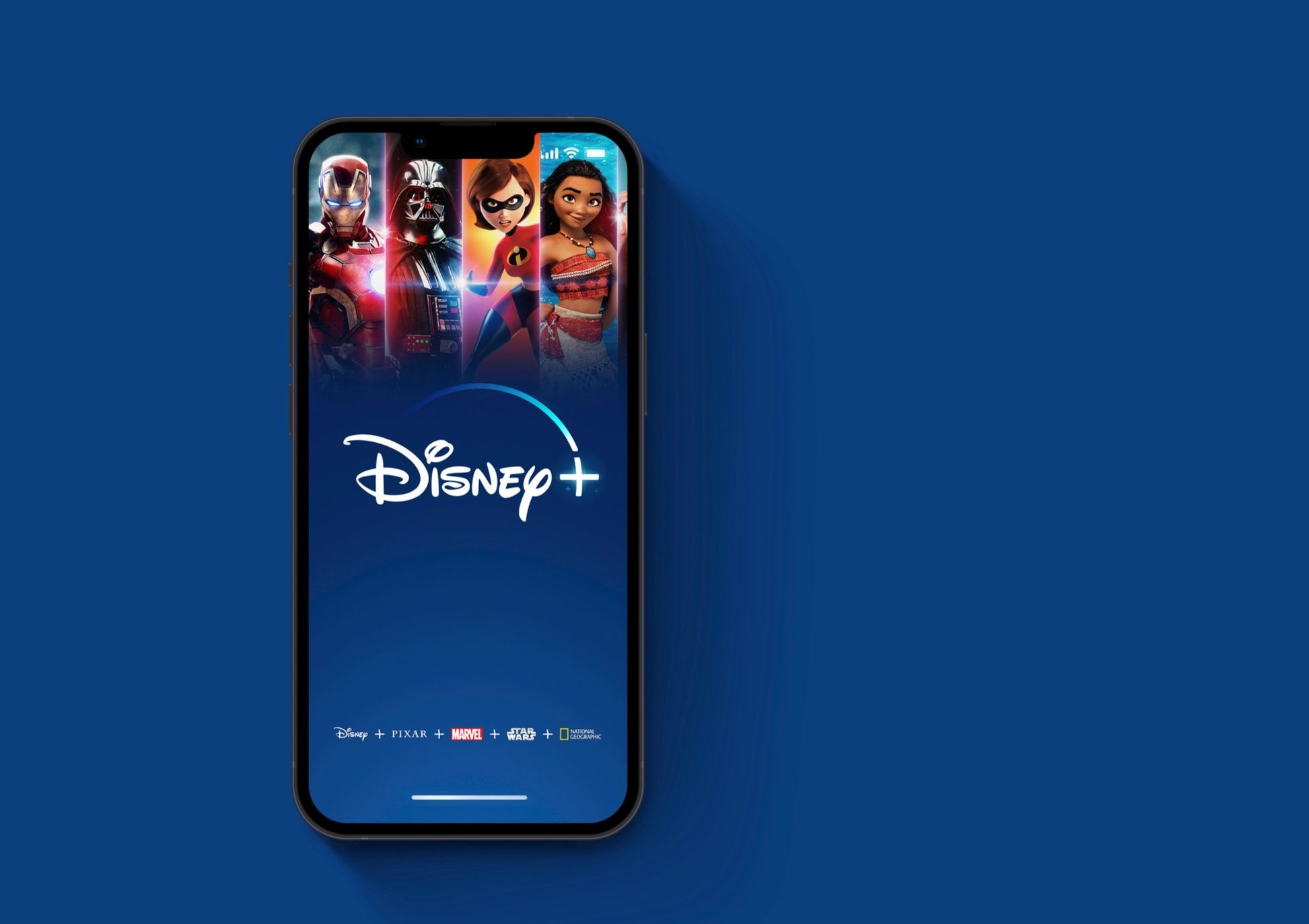
Disney’s Not-So Magical Ride & What It Means for Your Company
Case Study in Modern Risk Management
Case Study Overview
American business leaders are navigating a complex, rapidly changing, social and political environment. Historically, executives, especially the C-suite at publicly traded entities, focused on meeting financial goals and appealing to investors. However, the notion that companies have a “broader purpose” and must deliver equal value to all stakeholders gained momentum in recent years. This shift to stakeholder capitalism caused many pro-business elected officials to condemn, threaten and take political retribution actions against any “progressive” company balancing the need to meet financial, environmental, and social impact goals.
Recently, no company has been more critiqued than Disney. Its ongoing and very public saga dominates headlines as the company aims to address the desires of opposing stakeholders.
So, what happened at Disney? TL;DR
The Walt Disney Company is known as one of the world’s premier creators of entertainment, amusement, and storytelling. It’s also an organization “committed to creating a better world. A world of belonging where each person feels seen, heard, and understood.”
This pledge was put to the test by all major stakeholder groups after Florida lawmakers proposed and passed two controversial bills, impacting Disney’s diversity training, corporate free speech, and LGBTQ+ employees and customers. While initially only advocating against these issues with legislators “behind the scenes,” Disney, the state’s largest private-sector employer, faced pushback from stakeholders encouraging the company to act publicly.
At the same time, investors, employees, media, and brand advocates highlighted Disney’s financial support of anti-LGBTQ political candidates and its history of censoring same-sex relationships onscreen. These revelations led Disney CEO Bob Chapek to publicly criticize the legislation and the bill’s vocal advocate, Florida Governor Ron DeSantis. In response, DeSantis and other Republicans criticized the company stating, Chapek took a “family value entertainment business and made it into a woke culture war.” Quickly, the state legislature politically retaliated — passing a law to remove Disney’s special tax and regulatory status.
Throughout this time, Disney’s stock plummeted, employees staged protests, #boycottdisney trended on social media, philanthropic partners rejected corporate donations, negative coverage dominated media, and more. Eventually, Disney’s board of directors replaced Chapek with the company’s former CEO, Bob Iger. Iger immediately aimed to compromise with politicians while meeting the needs of other stakeholder groups like employees and customers.
Will Disney get its happy ending? The story is still ongoing; however, at IGC, we quickly recognized the importance of the landmark incident and decided to capture and analyze Disney’s timeline, actions, and responses in real-time to help companies like yours in the future.
We encourage you to read the information below and request to join our corporate social impact community if you want to ask questions or share your opinions with other business leaders.
Christine Todd Whitman, a former Republican governor of New Jersey and EPA administrator under President George W. Bush
“DeSantis has passed ‘homophobic legislation.’ Targeting the businesses of his perceived adversaries, DeSantis attacked Disney for opposing the ‘Don’t Say Gay’ law. He has moved to dissolve their special taxation district, despite the fact that the district keeps neighboring county taxpayers from bearing the huge costs of Disney World’s infrastructure.”
Key Corporate Terms
-

Social Impact
Business-led education, enablement, and action internally and externally through people-centric policies and programs that measurably improve outcomes for stakeholders, communities, and the planet.
-

Stakeholder Capitalism
A corporate strategy in which long-term success requires companies to maximize shareholder value and measurably improve outcomes for key stakeholder groups, including employees, customers, and partners.
-

Political Influence
A legitimate effort by a company, coalition, or industry association to use expertise, authority, finances, and other resources to shape public policy, elections, civic affairs, or societal issues.
-

Political Retribution
When a federal, state or local government official threatens, attempts, or acts against a company because it possesses different policy views, values, or goals from the candidate, elected official, agency, or political party.
Recommended Reading
Prior to diving into the case study, review these primers.
Full Disney Timeline
At IGC, we believe capturing and analyzing the timeline, actions and responses to this landmark incident is important. The information included in this case study comes from publicly available materials, not direct interviews.
Click for the text-only timeline
Top 5 Lessons Your Company Can Learn from Disney
Here are the top takeaways for business leaders from the Disney situation, including IGC’s best practices for how your company can participate in stakeholder capitalism while reducing the threat of political retribution.
CLICK BUTTONS BELOW TO JUMP TO A SPECIFIC LESSON
Lesson 1
Clearly state and act on your company’s purpose
“When you believe in a thing, believe in it all the way, implicitly and unquestionably.”
—Walt Disney
Stakeholders, especially employees, expect businesses to weigh in on a variety of social causes; however, your company can’t meaningfully take a stance on everything. Therefore, it’s important to align your organization’s purpose, mission, values, objectives, and culture with its ESG strategy.
What is Purpose?
According to Robin Nuttall, a leader at McKinsey’s ESG and regulatory strategy practice: “Purpose answers the question of why your company exists. What is its positive impact on the world? Why do employees get out of bed in the morning and come to work? That is underpinned by purposeful activity, which often takes the form of environment, social, and governance factors.”
Disney Clearly Defines and Articulates Purpose
Disney does an excellent job at clearly stating its core, high-level objectives and culture:
Purpose: We are committed to creating a better world.
Mission: The mission of The Walt Disney Company is to entertain, inform and inspire people around the globe through the power of unparalleled storytelling, reflecting the iconic brands, creative minds and innovative technologies that make ours the world's premier entertainment company.
Vision: be one of the world’s leading producers and providers of entertainment and information
Values: optimism, innovation, decency, quality, community and storytelling
Cultural Guidelines
make everyone’s dreams come true
you better believe it
never a customer, always a guest
all for one and one for all
share the spotlight
dare to dare
practice, practice, practice
make your elephant fly
capture the magic with storyboards
Disney’s strong, transparent purpose and transparency are core to the company. In fact, the Disney Institute, the professional development and external training division of The Walt Disney Company, offers training specifically on purpose.
Disney Takes a Methodical Approach to ESG Strategy
“The most potent place for business to play is where we’re trying to scale good. It’s about finding the intersection of business significance and societal significance and layering onto that your ability to make change in an area,” said PwC’s Corporate Responsibility Strategy and Implementation Leader Jeff Senne.
Historically, experts have praised Disney for its social impact efforts. While many organizations develop priorities based on executive “passion projects” or the latest headlines (pandemic, Black Lives Matter, women’s rights), Disney takes into consideration “a wide, complex, and evolving set of environmental, social, and governance (ESG) issues” to inform its award-winning, corporate social responsibility (CSR) efforts.
Specifically, Disney developed its ESG priorities based on the following:
an evaluation of each issue’s importance to the businesses and society
interviews with more than 50 internal stakeholders, including the CEO, executives, employees in every business and region
ongoing tracking of expert and proprietary research
benchmarking of peer companies
third-party studies to understand what issues are important to consumers and other external stakeholders
review of relevant reporting and evaluation standards
This strategic approach to social impact aligns with the “Accountability Principle” developed by the Corporate Political Responsibility Taskforce (CPRT) at the University of Michigan’s Erb Institute. One of four strategic tenets, the Accountability Principle states that “firms are accountable for their political activities, actively striving for alignment with their commitments to purpose, values, stated goals and stakeholders.” The standard also notes that companies can “model responsiveness and inclusion by identifying and consulting a broad range of stakeholders and considering their interests and concerns when planning political priorities, positions and activities,” or in this case, social focus areas.
According to Disney’s 2021 Corporate Social Responsibility Report, the outcome of this due diligence was for the business to focus on three key areas:
diversity, equity, and inclusion (DEI)
human capital management
and climate change
Disney Falls Short on Applying Purpose-Driven Tactics Quickly
For this Disney case study, the DEI focus is important because it’s the foundation and justification for the media powerhouse’s involvement in LGBTQ+ issues, the “Don’t Say Gay” legislation, and the “Stop WOKE” Act.
When it comes to products, Disney delivered on its core purpose to “inspire a better world through the power of stories.” The company won the top honor at the 2022 GLAAD Media Awards, which recognizes fair, accurate, and inclusive representation of the LGBTQ+ community. The Disney/Marvel film Eternals was the company’s first superhero tale to feature a same-sex couple as loving parents. Disney’s subsidiary Hulu also released an LGBTQ+ docuseries called Pride about “six decades of loving out loud.” The effort chronicled “the struggle for LGBTQ+ civil rights in America from the 1950s through the 2000s.”
While Disney gained recognition for its Pride storytelling efforts, the company failed to fully live that purpose when it came to political influence. With the “Don’t Say Gay” and “Stop WOKE” bills, Disney followed the common corporate lobbying practice of publicly staying silent on an issue but meeting privately with elected officials to voice opinions on the pending legislation.
Sometimes this approach is best for a business; however, Disney relied on this tactic for too long. The company should have publicly commented sooner, highlighting the following business justifications:
DEI is one of three CSR priorities for Disney
Disney employees are extremely vocal on LGBTQ+ issues
LGBTQ+ products generate revenue
Many of Disney’s brand advocates, investors, and customers were calling on the company to act
Key Lesson
Having a clearly defined, authentic purpose helps your company determine if, when, and how to engage in potentially polarizing social and political efforts.
IGC Solution: Purpose Workshop
Purpose is more than fluffy marketing text that lives on the About Us section of your website. When viewed as a strategic imperative, a clearly defined purpose informs key business decisions that impact growth and improve relationships with investors, employees and customers. IGC can help you create or enhance your purpose using interactive exercises, comprehensive research, proven messaging frameworks, and brand analytics capabilities.
CLICK BUTTONS BELOW TO JUMP TO A SPECIFIC LESSON
Lesson 2
Ensure executives understand, support, and discuss your company’s political, social and environmental efforts
“Courage is the main quality of leadership… no matter where it is exercised. Usually, it implies some risk — especially in new undertakings. Courage to initiate something and to keep it going, pioneering and adventurous spirit to blaze new ways, often, in our land of opportunity.”
—Walt Disney
No longer is having an MBA and a stellar resume enough to prepare today’s C-suite for when the “unexpected” happens. Modern CEOs must be ready to publicly discuss all kinds of issues. From standard business updates like quarterly earnings to mainstream stories like Elon Musk’s purchase of Twitter, all topics are fair game.
In the social impact arena, corporate leaders are often eager to tout their one-off efforts. They share blog posts about big donations, Instagram pictures of team volunteer activities, and press releases on coalition letters. But communicating activities isn’t enough. Today’s execs must be thought leaders, vocal advocates, and change makers.
The Spotlight is on CEOs to Speak Out
Data shows the increased pressure on today’s leaders to communicate and act on political, social, and economic issues. In an increasingly polarized environment, corporate stakeholders rely on business leaders to provide timely, accurate information on a wide variety of topics.
85 percent expect CEOs to play a role in strengthening our social fabric, taking a public stand and business action on key issues
58 percent of CEO received physical threats after taking a position on a racial and/or political issue. While 40 percent received physical threats because they had not taken a position.
72 percent want businesses to defend facts and expose questionable science being used to justify bad social policy
68 percent of employees would consider leaving their employer for an organization that takes a stronger stand
These data points are clearly illustrated through Disney’s story. Many corporate leaders were shocked at the news that Bob Iger was returning to the helm of the company after Bob Chapek filled the seat for less than three years. Iger handpicked Chapek as his successor, and Iger extended his retirement to help coach Chapek in the role. While poor financials and an untimely reorganization lost Chapek the job, his inability to navigate the complex political and social landscape didn’t help.
Before giving up control, Chapek had some strategic business wins. Theme parks were thriving after being closed during the pandemic, paid subscriptions to the Disney+ streaming service exceeded goals, and new movies were deemed successful; however, Chapek failed to win over key stakeholders, including employees and elected officials. And as management expert Peter Drucker says, “Culture eats strategy for breakfast.”
Although responsible for the largest employer in the state of Florida, Chapek couldn’t build meaningful relationships with the historically pro-business, state legislators. He got stuck in the divide between pro-business and anti-establishment Republicans. The latter is a new class of right-wing, rank-and-file lawmakers who disapprove of corporations, especially in the tech, media, and entertainment industries. “And then there’s the ethical pretzel of DeSantis, who enjoys talking about his support for free speech, but also punished Disney for the sin of speaking freely,” said Derek Thompson in his Atlantic article, “This Is How America’s Culture War Death Spirals: Why Disney vs. DeSantis is the Future of Politics.”
While initially not saying anything publicly about the anti-LGBTQ+ legislation, Chapek dramatically changed tone on the heels of employee protests. This sudden shift indicated to some that Chapek surrendered to the “loud liberals.” Disney, therefore, became the poster child for corporate “wokeness” and cancel culture. Chapek did little publicly to combat the “us vs. them” message or educate the public about why they suddenly switched strategies. He also missed key advocacy opportunities like signing pro-LGBTQ+ business coalition letters.
This reputation made Disney and Chapek an easy target for Governor DeSantis, who wrote the script for today’s socially conservative ideology. The DeSantis “Stop WOKE Act” provides businesses, employees, and families the tools to “fight back against woke indoctrination.” When promoting the legislation, which is currently being battled in the courts, DeSantis used a press release to put a spotlight on businesses acting on racial equity. He specifically called Bank of America, Raytheon, and Google for their anti-racism programs that teach that the US has a “system of white supremacy.” Adding Disney to this rhetoric was easy and cost the company.
Key Lesson
Stakeholders expect business leaders to get involved in social and political issues. You can gain trust, accelerate impact, and meet business goals faster with a clear strategy.
IGC Solution: Executive Training
IGC and our partners train and support executives on all facets of social impact. We use innovative, data-driven methods to obtain stakeholder feedback, analyze your brand, and provide customized training for your Board, C-Suite or department leaders. We give you the confidence, tools, and peer network needed to navigate this complex political and social environment.
CLICK BUTTONS BELOW TO JUMP TO A SPECIFIC LESSON
Lesson 3
Ensure companywide understanding and alignment on ESG activities
“The way to get started is to quit talking and begin doing.”
—Walt Disney
Social Action and Inaction Pose Risk
Out of the gates, Disney did a few things right, including clearly stating the company’s purpose and ESG goals. However, once the organization had a prioritized list of focus areas (DEI, human capital management, and climate change) they didn’t ensure an aligned effort on its functional plans.
Companies like Disney, which don’t have a fully integrated approach, face a wide range of risks, including:
revenue loss
reputational damage
recruitment and retention problems
political retaliation, and more
Let’s dive into Disney’s DEI imperative against the activities in the above timeline. To illustrate, we are going to take the seven components of IGC’s social impact definition and evaluate Disney.
|
Category |
Details |
IGC Rating |
|
Purpose |
Defined core purpose to “inspire a better world through the power of stories” |
Green |
|
People |
Disconnect between executives and employees |
Red |
|
Programs |
Strong employee resource groups, including new LGBTQ+ program in India Robust supplier diversity program that includes LGBTQ+-owned businesses |
Green |
|
Products |
Won industry awards for LGBTQ+ content; Pixar employees claim LGBTQ censorship |
Yellow |
|
Policies |
Standards of Business Conduct commit to an environment where “everyone is afforded dignity and respect” |
Green |
|
Philanthropy |
Offered donation to LGBTQ+ nonprofit, but only after employee and customer pushback |
Yellow |
|
Political Influence |
No public statement on bills or lobbying effort until employee protest |
Red |
Spotlight: Disney’s Philanthropic and Political Strategy Misalignment
Corporate philanthropy isn’t new for Disney. The company regularly performs charitable giving through financial contributions, collaborations with nonprofit organizations, in-kind donations, and employee volunteerism. Disney also aligns its philanthropic efforts with its DEI focus. “Our intention is to direct more than 50 percent of our annual charitable giving to programs that support underrepresented communities” the company states on its social impact hub. To this end, the company offers several grants directed towards the Asian American, Pacific Islander, Black, Hispanic, Native American/Indigenous, and LGBTQ+ communities, as well as People with Disabilities, Veterans, and Women.
For LGBTQ+ members and allies, Disney also releases an annual collection of Pride-themed merchandise alongside contributions benefiting organizations globally that support LGBTQ+ communities. However, for many people, the company’s attempted donation to the Human Rights Campaign (HRC) on March 9, 2022 during the “Don’t Say Gay” controversy seemed disingenuous. HRC Interim President Joni Madison stated, “we will not accept this money from Disney until we see them build on their public commitment and work with LGBTQ+ advocates to ensure that dangerous proposals, like Florida’s Don’t Say Gay or Trans bill, don’t become dangerous laws, and if they do, to work to get them off the books.”
In this instance, Disney’s political influence activities didn’t match its philanthropic donations; therefore, the check-writing strategy didn’t work. This analysis demonstrates its paramount to ensure a coordinated effort across all facets of the business internally and externally. One of the best ways to accomplish this goal is to treat social impact like you would any other business imperative at look at the following:
Strategy: align issues to business goals, culture, values
Proficiency: understanding, experience, process, skills, tools
Capacity: bandwidth and internal/external resources
Competition and Trends: research macro-trends and actions of competitors
Communications: internal and external stakeholder updates and feedback
Funds: money to identify, assess, track and engage on issues
Measurement: analyze and report on effectiveness
IGC Solution: Social Impact Risk and Opportunity Assessment
Can your company easily connect its political influence and social impact efforts to its mission, vision, values, culture and objectives? If not, you’re not alone. We understand the corporate social impact journey. We help you articulate difference you want to make and integrate into your core business, and then develop the governance structure and funding models that best fit your goals.
CLICK BUTTONS BELOW TO JUMP TO A SPECIFIC LESSON
Lesson 4
Internally and externally communicate your story early and often
“Our heritage and ideals, our code and standards - the things we live by and teach our children - are preserved or diminished by how freely we exchange ideas and feelings.”
—Walt Disney
Strong corporate communication is key to leveraging stakeholder capitalism and reducing the threat of political retaliation. Your company should have a clearly defined communication strategy for all stakeholders. Not all employees will be happy with your company’s position on an issue, but you should be ready for various responses and make sure messaging on the issue is aligned to your organization’s mission, vision, and values. Additionally, with the popularity of social media, you should be prepared for internal messages to go public. All these lessons can be found in Disney’s case study.
Disney’s connection to the “Don’t Say Gay” and “Stop WOKE” bills prove that both corporate social action and inaction pose reputational, financial, and legal risks. While initially working behind the scenes directly with lawmakers, Disney’s initial lack of official public response from top executives allowed employees, the media, and the public to create and control the narrative. Leadership's communications reticence also directly and negatively impacted the company’s relationship with its workforce and passionate fanbase. The old adage, “if you don’t have anything nice to say, don’t say anything at all” made Disney seem like one of the villains they create, not a socially-conscience and culturally-influential megabrand.
Disney missed an opportunity to create an authentic, purpose-driven communications campaign. Leveraging their masterful storytelling skills, Disney could have educated, empowered, and worked across partisan lines to inspire, unite, and drive meaningful change. This alternative approach aligns with the CPRT’s Transparency Principle that “firms communicate openly and honestly about their political activities to promote informed stakeholder decision-making and public trust.”
According to the CPRT, this means firms have certain foundational responsibilities, including:
Companies provide transparency in their political activities, publicly reporting on their CPR oversight processes and policies, all direct political spending, spending through trade associations or other third parties influencing on their behalf, and any actions to address misalignments under accountability
Companies communicate openly about their political influence approaches, outlining criteria, issues, positions, goals, stakeholder consultation processes and affiliations, to foster trust and enable stakeholders to make informed decisions.
Companies provide timely, accurate information and expertise to elected representatives at all levels of government as needed to support fully informed, effective policymaking.
With a well-documented strategy and governance process, it’s easier to create supporting communications plans that follow this guidance. And even today, it’s clear that Disney continues to have a communications gap between leadership and employees. They recently announced employees must return to the office 4 days a week, despite widespread unpopularity among its workforce.
IGC Solution: Impact Communications
IGC specializes in impact communications and has decades of experience developing campaigns, messages, and programs that positively convey social and environmental impact. We can help you engage stakeholders and amplify your work across a wide range of activities from investor presentations to employee events.
CLICK BUTTONS BELOW TO JUMP TO A SPECIFIC LESSON
Lesson 5
Transparently report your company’s efforts and outcomes
“A person should set his goals as early as he can and devote all his energy and talent to getting there.”
—Walt Disney
Qualitative and quantitative results are paramount to justifying any social impact program at your company.
From an outside perspective, it seems like Disney is in the infancy stage of social impact reporting. Let’s take DEI, for example. While Disney wants a workforce reflective of its diverse audience, it’s hard to know exactly how its employees and efforts match up. Disney states that 29,000 employees participate in employee resource groups (ERGs), including the newly launched LGBTQ+ ERG in India. Beyond that, there is very little measurement. On Disney’s Diversity Dashboard only race and “women” are categorized. Sexual orientation and gender identity are notably missing. They also don’t include any metrics around inclusion – meaning the sense of belonging minorities feel at work.
Better reporting can lead to better outcomes, stories, and business impacts. With so much effort put into building internal and external programs and spreading the word, Disney needs to prove the ROI of its social impact efforts. But beyond the traditional volunteer hour, corporate match metrics, and very basic diversity numbers, there isn’t a lot of publicly available information.
IGC Solution: Social Impact Evaluations
At IGC, we can help you build sustainable collaborations, develop KPIs, report impact, and benchmark progress so you can make continuous improvements. A core benefit of IGC is our ability to collect, standardize and report data at various levels: by social impact topic, industry, company, etc. We also develop common benchmarks and tie them to financial standards.
CLICK BUTTONS BELOW TO JUMP TO A SPECIFIC LESSON
The Comprehensive Disney-DeSantis Timeline in Simple Format
A long time ago in a country not so far, far away…
2020: Trump Lays the Foundation for Legislation Against Corporate DEI Training
September: Trump Takes on “Woke” Corporations
President Trump issues executive order (EO) 13950, “Combat Race and Sex Stereotyping,” to prohibit any government employees or federal contractors from holding diversity training on historical racism.
December: Executive Order Subject to Preliminary Injunction
The Northern District Court of California issues a nationwide preliminary injunction, emphasizing that the EO restricted speech the First Amendment protects and noted the government’s “impermissible reach” in restricting content used to train contractors.
2021: New Admiration Pushes for Comprehensive Approach to Equality
January: Biden Revokes EO on Diversity and Inclusion
President Biden formally rescinds EO 13950 and signs EO 13985 stating the Federal Government should pursue a comprehensive approach to advancing equity for all, including people of color and others who have been historically underserved, marginalized, and adversely affected by persistent poverty and inequality.” On the same day, Biden signs a separate but related order on “Preventing and Combatting Discrimination on the Basis of Gender Identity or Sexual Orientation.”
2022: Political Fight Heads to Florida and Makes Disney Center of a Nationwide Cultural Debate
January 11: Florida Lawmakers Fill the “Individual Freedom” and “Parental Rights in Education” Bills
Disney’s social impact saga begins when lawmakers in Florida fill two controversial pieces of legislation:
House Bill 7, the Individual Freedom Bill, restricts race-based education in businesses, schools, and universities. Specifically, it bans any corporation or school from teaching that “an individual’s moral character or status, as either privileged or oppressed, is necessarily determined by his or her race, color, sex, or national origin.” This proposed legislation triggered a nationwide debate on diversity training, corporate free speech, and critical race theory. Florida Governor Ron DeSantis labels it the “Stop Wrongs to Our Kids and Employees Act,” or Stop WOKE Act.
House Bill 1557, the Parental Rights in Education Bill, prohibits any classroom instruction involving sexual orientation or gender identity through the third grade and any discussions about it in older grades if it’s “in a manner that is not age appropriate or developmentally appropriate.” The bill also allows parents to sue schools or teachers that engage in these topics. Critics colloquially called it the “Don’t Say Gay” bill and marked it as discriminatory against the LGBTQ+ community. The bill’s author, Republican State Senator Dennis Baxley, actively backed anti-gay legislation for years, including laws that would block gay couples from adopting children. He also compared kids who live with same-sex parents to kids raised by alcoholics and abusers.
February 7: Governor DeSantis Publicly Supports HB 1557
DeSantis publicly states his support for the Parental Rights in Education Bill, noting it is “entirely inappropriate for teachers to be having conversations with students about gender identity.”
February 8: President Opposes Bill
Biden tweets his opposition to the bill and declares “love and acceptance” for the LGBTQ+ community.
February 14: Media Storm Begins
Equality Florida, a political advocacy group, launches an ad campaign against the bill, receiving widespread media coverage and prompting others to speak out against the bill.
February 17: Corporate Political Spending Highlighted
Popular Information publishes an article revealing the corporations that fund the authors and sponsors of the bill. Disney is not included in the news, but the viral piece makes others question the big brand’s financial contributions.
February 24: Bill Passes House, Former CEO Opposes
The House passes the education bill and refers it to the Senate. Right after, former Disney CEO Robert Iger tweets his opposition.
Feb 25 – March 1: Disney Gathers Internal Stakeholder Feedback
Disney executives hold intense internal dialogues on the controversial topic and Latondra Newton, Disney’s chief diversity officer, sends a message to staff referencing “deeply troubling and heartbreaking” developments in the news. She also notes Disney’s CEO Bob Chapek asked “to meet with leaders in our company’s LGBTQ+ community to discuss how Disney can best support these important and valued employees and cast members.”
March 2: Insiders Make Claims About Disney CEO
Hollywood Reporter publishes a widely shared article about Chapek citing insiders who claim he is “less willing than predecessor Bob Iger to take political stands – including on LGBTQ issues and voting rights.”
March 3: Employees and Philanthropic Partners Urge Disney to Oppose the Bill
The AIDS Healthcare Foundation launches a TV ad campaign and holds rallies with 100s of people urging Disney to publicly oppose the legislation. Several Disney employees begin to publicly speak out and generate buzz about their employers’ silence.
March 3: Disney Issues a Brief Statement Via Good Morning America
Disney acknowledges the issue: “We understand how important of an issue this is to our LGBTQ+ employees and many others.”
March 7: Disney CEO Issues Internal Communications and Promises to Review Political Influence Efforts
Chapek sends a companywide memo addressing employees’ concerns and touting the organization’s long history of supporting LGBTQ people. He highlights efforts, including the production of content highlighting LGBTQ relationships, publicly supporting pride events, and being there during tragedies like the Pulse nightclub shooting.
Chapek argues Disney’s best approach to addressing LGBTQ inequality is “through the inspiring content we produce, the welcoming culture we create, and the diverse community organizations we support.” He adds, “corporate statements do very little to change outcomes or minds.”
Chapek also informs employees that the company’s new chief corporate affairs officer would evaluate political giving and global advocacy strategies.
DeSantis Staff Says Bill Opponents Are Pedophiles
Christina Pushaw, the press secretary for DeSantis accuses opponents of the “Don’t Say Gay” bill of condoning pedophilia.
This sentiment is echoed by Kyle Lamb, another member of DeSantis’ communications team, who insists that “either you support the sexualization of children under 10 years old or you don't.”
March 8: A Monumental Day for Disney (and Not in a Good Way)
News Breaks on Disney’s Political Contributions & History of LGBTQ+ Censorship
After an employee leaked Chapek’s memo publicly, Popular Info publishes an article showing Disney donated to every single sponsor and co-sponsor of the education bill, totaling nearly $300k. Also, the Animation Guild expresses its disappointment with Disney’s response, and Pixar questions Disney’s commitment to change.
Member of the Disney Family Calls Out CEO’s Fear of Political Retribution
Abigail Disney, co-founder Roy Disney’s granddaughter, calls out Chapek for being “more worried about right-wing backlash” than meeting the needs of employees and customers.
#boycottDisney Trends on Social Media
Internal pressure from employees and external messages from loyal brand advocates continues to gain steam. The hashtag #boycottDisney starts trending on social media, encouraging people to disassociate with the brand until the company takes a stand on the issue.
Head of Disney's Streaming Division Speaks Out
Michael Paull makes personal donation to the Human Rights Campaign and advises upset employees to call the "Employee Assistance Program" and ask to be referred to a therapist.
March 9: Disney Can’t Donate Its Way Out of the Problem
The Human Rights Campaign (HRC) refuses a $5M donation from Disney. “[We] will not accept this money from Disney until we see them build on their public commitment and work with LGBTQ+ advocates to ensure that dangerous proposals, like Florida’s Don’t Say Gay or Trans bill, don’t become dangerous laws, and if they do, to work to get them off the books,” says Interim President Joni Madison.
Madison also notes the long history of corporations helping advance human rights, stating, “Businesses have had and continue to have a major impact in the fight for LGBTQ+ rights, from marriage equality to the defeat of House Bill 2 in North Carolina and beyond.” HRC also encourages Disney employees to keep fighting the bill and pushing their employer.
March 9: Employee Letter Claims Disney Censors Same-Sex Affection in Pixar Films
Pixar employees respond to Chapek’s internal memo. The CEO had stated the biggest impact the company can make is to create a more inclusive world “through the inspiring content we produce;” however, Pixar employees claim, “We at Pixar have personally witnessed beautiful stories, full of diverse characters, come back from Disney corporate reviews shaved down to crumbs of what they once were. Even if creating LGBTQIA+ content was the answer to fixing the discriminatory legislation in the world, we are being barred from creating it.”
March 9: CEO Admits to Shareholders That Disney Privately Lobbied Against the Bill
During the annual investor meeting, Chapek tells Disney shareholders the company didn’t take a public stance on the bill but had quietly lobbied against it. “We were opposed to the bill from the outset, but we chose to not take a public position on it because we thought we could be more effective working behind the scenes, engaging directly with lawmakers on both sides of the aisle,” Chapek says. The CEO also shares plans to meet with Governor DeSantis in person to discuss the legislation.
March 10: The Individual Freedom or “Stop WOKE” Act Passes in Republican-led Legislature
The legislation, which restricts how race is discussed in schools, colleges and workplaces, passes mostly along party-lines in the Republican-led Legislature. It prohibits any teaching that could make employees or students feel they bear personal responsibility for historic wrongs because of their race, color, sex or national origin.
March 11: CEO Issues Public Apology and Suspends Political Donations in Florida
Chapek publicly apologizes for not being a “stronger ally” and confirms the company paused all political donations in Florida as it reviews its approach to advocacy.
March 21: Disney Hosts Employee Dialogues
Disney hosts online, internal conversations on the legislation and the company’s response (or lack thereof). Chapek tells staff we didn’t previously speakout because public statements "are often weaponized by one side or the other to further divide and inflame."
March 22: Disney Posts a Rainbow Mickey & Generic LGBTQ+ Support Statement
Disney posts a public statement of support for the LGBTQ+ community, noting “[We are] committed to creating experiences that support family values for every family, and will not stand for discrimination in any form. We oppose any legislation that infringes on basic human rights…”
March 22: DeSantis Signs “Stop WOKE Act” Targeting Disney and Other Companies’ Diversity Training Programs
House Republican sponsor of HB7 Bryan Avila specifically cites Disney’s “Reimagine Tomorrow” program in supporting the Individual Freedom legislation. Avila says Disney was educating employees about “systemic racism.”
March 23: Disney Employees “Walkout” to Protest the Company’s Management of the Situation
Disney employees organize a walkout at sites across the US to protest the company’s lack of response to the legislation and its donations to supporters of the “Don’t Say Gay” bill.
March 28: Governor Critiques “Woke Corporations” and Signs Bill Into Law
Governor DeSantis tells supporters that he will not let “woke” corporations interfere with policies and signs HB1557 into law. “I don’t care what corporate media outlets say. I don’t care what Hollywood says. I don’t care what big corporations say. Here I stand. I’m not backing down,” DeSantis touts.
March 28: Disney Condemns the Law
Disney immediately condemns the legislation and vows to help get it repealed.
March 28: Press and Social Media Storm Swirls
#boycottDisney tweets accumulate millions of impressions, as reported by analytics firm ListenFirst. Only this time, the hashtag calls out Disney for standing up against the law.
“This CEO has taken a family value entertainment business and made it into a woke culture war. As a parent I don’t want my family to have any exposure to any DIS entertainment,” says a commenter. Additionally, popular Fox News personality Tucker Carlson says Disney had “a sexual agenda for 6-year-olds" and the company is "creepy as hell."
March 29: Businesses Coalition Letter Surfaces
News of opposition among business leaders slowly builds momentum as the bill moves through Florida’s Republican-controlled Senate. CNBC publishes an article about a business coalition sponsored by Freedom for All Americans. The group, which includes 45 major brands such as Starbucks and Nordstrom, signs a joint letter opposing the bill. Disney was not included.
March 29: Other States Kickoff Copycat Efforts
Politicians from other states, including Texas and Ohio, express their support for the Florida bills and suggest they will attempt the same kind of legislation.
March 30: Rumors of Political Retaliation Against Disney Emerge
Comments from Fox News’ Laura Ingraham and a post from a North Fort Myers Republican representative report potential political retaliation against Disney. Ingraham’s line, “Mickey is crying,” goes viral and the notion of political retaliation against the corporation becomes real: “They're going to lose billions in income until someone has the guts to do their own hostile takeover and return to common sense. But let's look on the bright side here. Ron DeSantis really smoked them out at Disney. Just like Brian Kemp smoked out Coca Cola and Delta when they supported boycotting the all-star game after leftists screamed about the voter integrity law in Georgia.”
April 2: Florida State Lawmakers Threaten Disney Directly
Many Florida lawmakers begin threatening to revoke a 55-year-old law that enables Walt Disney World to essentially function as its own municipal government under a special zone called the Reedy Creek Improvement District. The move would have huge tax implications for Disney, one of Florida’s largest private employers with more than 60,000 workers.
Reedy Creek is responsible for paying the cost of all municipal services, including power, fire protection, water, waste management and roads; however, it can also collect taxes and issue bonds. According to NBC News, the district has a budget of more than $169 million — more than 90 percent of which comes from the collection of property taxes on Disney's real estate -- and maintains an AA bond rating from Fitch, one of the biggest US credit-rating agencies.
April 3: Disney Flaunts Its Seven GLAAD Media Awards
The GLAAD industry honors recognize “fair, accurate, and inclusive representation of the LGBTQ+ community.”
April 19: Florida State Lawmakers File Anti-Disney Bill
State senators file SB-4C to end Disney’s self-governing powers over the Reedy Creek Improvement District.
Opponents Say DeSantis ‘Governs by Revenge"
Industry watchers draw a straight line between Disney’s opposition to DeSantis’ “Don’t Say Gay” bill and an effort by the Florida Governor to dissolve the Reedy Creek Improvement District. Then Sen. Tina Polsky, D-Boca Raton, says, “To govern by revenge, to govern for punishment is not governing. It’s authoritarianism. It’s fascism.”
April 20: State Senate Approves Bill
A day after filing, Florida Senate approves the measure in a 23-16 vote, with one Republican joining the Democrats in opposition.
April 21: House Approves Bill to Eliminate Disney’s Improvement District
The Florida House of Representatives follow the Florida Senate and votes to pass the bill to terminate Disney's Reedy Creek Improvement District.
April 21: House Removes Disney’s Censorship Protection
In a second vote, the Florida House passes a measure to remove the protection Disney has regarding tech firm censorship.
April 21: Disney Stock Falls
In March 2021, Disney stock was trading at nearly $200 per share, an all-time high; however, throughout this highly-public, social and political drama, investors react negatively. As of the market close on April 21, the stock is down nearly 33 percent year-over-year at near $120 per share.
April 22: Governor Approves WOKE Bill & Rallies Conservatives
Governor DeSantis approves the “Stop WOKE Act” and sets the dissolution of Reedy Creek for June 2023. “If Disney wants to pick a fight, they chose the wrong guy,” Governor DeSantis writes in a fund-raising email.
On his popular podcast, conservative personality Ben Shapiro says : “I am the most free-market person on the right … I think more freedoms for businesses are good.” To Disney he says, “if you decide to just become a woke corporation that does the bidding of your Democratic taskmasters, don’t be surprised if you get clocked by a legislative two-by-four. Eff around and find out.”
April 22: Local Community Questions Tax Implications of Bill
Local taxpayers and government officials worry they will have to assume Disney’s $766 million bond debt owed by Reedy Creek and become responsible for maintaining Disney’s infrastructure once the district is dissolved.
May 10: Federal Anti-Disney Legislation Introduced in Congress
Republican Senator Josh Hawley from Missouri introduces the Copyright Clause Restoration Act designed to strip Disney of copyright protections.
June 10: Disney’s Unofficial “Gay Days” Occurs
Gay Days at Disney World is the theme park’s most popular gay and lesbian celebration, attracting more than 150,000 gay and lesbian travelers to Orlando annually since 1991. Despite the popularity, Disney has never endorsed Gay Days.
June 22: Preliminary Injunction Requested Against the Stop WOKE Act
Businesses unite, file lawsuit, and request preliminary injunction against the Stop WOKE Act, stating: “The governor, and the Florida Legislature acting at his behest, has repeatedly sought to punish companies who have engaged in speech that displeases him, in flagrant violation of the First Amendment. Because Governor DeSantis is not a monarch, but rather a democratically elected official, the Stop WOKE Act cannot stand.”
July 29: Disney Signs Pro-LGBTQ+ Letter with 170 Other Businesses
Disney signs an open letter in support of the “Respect for Marriage Act” along with 170 other companies and HRC.
September 28: Instagram Poll Claims the “Magic’s Gone” at Disney
More than 18,000 people respond to an unofficial, unscientific Instagram poll with 76% saying “The Magic’s Gone.”
October 6: Investment Legend Seth Klarman Encourages Companies to Be Courageous
At a Harvard event, billionaire Seth Klarman says if politicians won’t lead, then the burden falls on business leaders, who are qualified because of their problem-solving skills. Klarman specifically criticizes politicians in Texas and Florida for attacking ESG and gay rights policies, adding that it makes no sense to go after Disney for its opposition of the “Don’t Say Gay” law. “Businesses need to find their courage,” he advocates.
October 21: Federal “Don’t Say Gay” Copycat Bill Filed, Putting Businesses at Greater Risk
House Republicans introduce a bill called the "Stop the Sexualization of Children Act," which aims "to prohibit the use of Federal funds to develop, implement, facilitate, or fund any sexually-oriented program, event, or literature for children under the age of 10, and for other purposes."
The language in the proposed legislation lumps together topics of sexual orientation and gender identity, with sexual content such as pornography. If passed, it would ban federal facilities from hosting or promoting “sexually oriented” events or literature and allow parents to sue government officials, agencies, and private entities if a child under 10 is "exposed" to such materials. This threat of lawsuit puts businesses at risk.
November 21: Bob Iger Makes a Surprise Comeback to Disney
Less than a year after retiring, Iger returns to Disney as CEO and serves as a beacon of hope for political compromise stating: "Do I like the company being embroiled in controversy? Of course not. It can be distracting, and it can have a negative impact on the company. And to the extent that I can work to kind of quiet things down, I’m going to do that.” He adds, “The state of Florida has been important to us for a long time, and we have been very important to the state of Florida.”
December 5: DeSantis Doubles Down Against Disney
Reports of a compromise bill, or “U-turn,” surface. DeSantis doubles down on his Disney attacks, scoring political points and donations from far-right conservatives. His spokesperson states, “Governor DeSantis does not make 'U-turns.' The governor was right to champion removing the extraordinary benefit given to one company." y attacking Disney, DeSantis scores big political points and donations from conservatives.
2023: The Story Continues…
Like most popular Disney creations, the journey does not end after the first story. After months of fallout, Disney is still reeling from the consequences surrounding the “Don’t Say Gay” and “Stop WOKE” legislation. With a presidential run on the horizon, DeSantis is likely to keep fighting “woke” companies like Disney. We will update this timeline as new developments arise.
January 9: DeSantis Reignites Fight with the "Mouse House"
As Florida readies to take control of the Reedy Creek Improvement District, a DeSantis representative states, “The corporate kingdom has come to an end. Under the proposed legislation, Disney will no longer control its own government, will live under the same laws as everyone else, will be responsible for their outstanding debts, and will pay their fair share of taxes.”
February 6: Florida Republicans Unveil Bill to Give Control of Reedy Creek to DeSantis
During a special legislative session to restructure the Reedy Creek Improvement District, Republicans introduce a bill to change the district’s name to the “Central Florida Tourism Oversight District” and require the governor to appoint a five-member oversight board.
February 8: Reedy Creek Board Signs New Agreement
The outgoing Reedy Creek supervisors (chosen by Disney) sign a new agreement that effectively strips the board of power and hands over authority to Disney.
February 8: Disney Announces Major Layoffs
CEO Bob Iger announces cuts to 7,000 jobs as part of an effort to save $5.5 billion in costs and make its streaming business profitable. The layoffs represent an estimated 3.6% of Disney's global workforce.
February 27: DeSantis Controls Special District
DeSantis signs legislation to overhaul and rename the special district and fills it with his donors and conservative activists.
April 3: DeSantis Investigates Reedy Creek Development Agreement, Iger Comments
DeSantis calls for a state investigation into the development agreement. When asked about Disney during an online shareholders meeting, CEO Bob Iger says that Governor DeSantis and Florida legislators appeared to be retaliating against Disney for exercising its constitutional rights.
April 17: DeSantis Threatens Additional Measures
DeSantis announces legislation to nullify the development agreement and require outside safety inspectors for Disney, as well as additional actions, including raising taxes, adding tolls, building a prison next to Disney World, etc.
April 26: Disney Sues DeSantis
Disney files a lawsuit asking a federal judge to void DeSantis’s takeover of the theme park district, as well as the DeSantis oversight board’s actions, on the grounds that they were violations of company’s free speech rights.
May 1: Oversight Board Appointed by DeSantis Countersues Disney
Oversight board files lawsuit that seeks to invalidate an agreement prior board members made with Disney, saying it amounted to a one-sided, rubber stamped deal.
May 5: DeSantis Enacts New Legislation
DeSantis signs bill into law that grants special district oversight boards the ability to nullify previously sanctioned development agreements.
May 18: Disney Cancels Plans for $1B Deal in Florida
Iger announces the company is withdrawing plans to build a $1B corporate campus housing more than 2,000 employees, citing “changing business conditions.”
IGC helps businesses build meaningful social impact programs that meet the needs of all stakeholders.
We approach each strategic engagement with a business lens to reduce risk and seize opportunities. But we are more than consultants. We have decades of public and private sector experience developing impactful programs.
